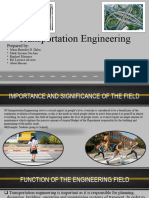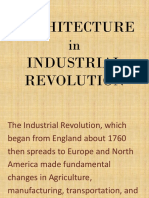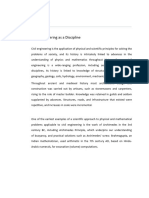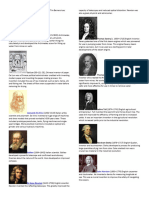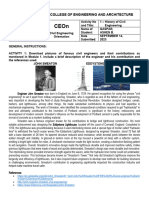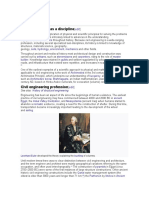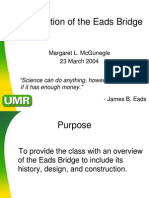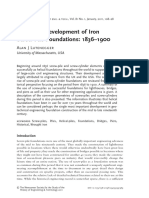0 ratings0% found this document useful (0 votes)
33 viewsIndividual Assignment JM
Individual Assignment JM
Uploaded by
Maslisa AffenddyThis document discusses some of the most influential civil engineers in history. It provides brief biographies of 8 civil engineers: Archimedes of Syracuse who invented the pulley; John Smeaton known as the "Father of Civil Engineering" for his work during the Industrial Revolution; Benjamin Wright declared the "Father of American Civil Engineering" for his canal construction; Squire Whipple who designed bridges and locks; Isambard Kingdom Brunel known for tunnels, railways, bridges and ships; Henry Bessemer who invented the steel production process; Arthur Casagrande who developed principles for earth and rock dams. The engineers made advances in science and technology and improvements to infrastructure and daily life.
Copyright:
© All Rights Reserved
Available Formats
Download as PPTX, PDF, TXT or read online from Scribd
Individual Assignment JM
Individual Assignment JM
Uploaded by
Maslisa Affenddy0 ratings0% found this document useful (0 votes)
33 views10 pagesThis document discusses some of the most influential civil engineers in history. It provides brief biographies of 8 civil engineers: Archimedes of Syracuse who invented the pulley; John Smeaton known as the "Father of Civil Engineering" for his work during the Industrial Revolution; Benjamin Wright declared the "Father of American Civil Engineering" for his canal construction; Squire Whipple who designed bridges and locks; Isambard Kingdom Brunel known for tunnels, railways, bridges and ships; Henry Bessemer who invented the steel production process; Arthur Casagrande who developed principles for earth and rock dams. The engineers made advances in science and technology and improvements to infrastructure and daily life.
Original Description:
uthm
Original Title
Individual Assignment Jm
Copyright
© © All Rights Reserved
Available Formats
PPTX, PDF, TXT or read online from Scribd
Share this document
Did you find this document useful?
Is this content inappropriate?
This document discusses some of the most influential civil engineers in history. It provides brief biographies of 8 civil engineers: Archimedes of Syracuse who invented the pulley; John Smeaton known as the "Father of Civil Engineering" for his work during the Industrial Revolution; Benjamin Wright declared the "Father of American Civil Engineering" for his canal construction; Squire Whipple who designed bridges and locks; Isambard Kingdom Brunel known for tunnels, railways, bridges and ships; Henry Bessemer who invented the steel production process; Arthur Casagrande who developed principles for earth and rock dams. The engineers made advances in science and technology and improvements to infrastructure and daily life.
Copyright:
© All Rights Reserved
Available Formats
Download as PPTX, PDF, TXT or read online from Scribd
Download as pptx, pdf, or txt
0 ratings0% found this document useful (0 votes)
33 views10 pagesIndividual Assignment JM
Individual Assignment JM
Uploaded by
Maslisa AffenddyThis document discusses some of the most influential civil engineers in history. It provides brief biographies of 8 civil engineers: Archimedes of Syracuse who invented the pulley; John Smeaton known as the "Father of Civil Engineering" for his work during the Industrial Revolution; Benjamin Wright declared the "Father of American Civil Engineering" for his canal construction; Squire Whipple who designed bridges and locks; Isambard Kingdom Brunel known for tunnels, railways, bridges and ships; Henry Bessemer who invented the steel production process; Arthur Casagrande who developed principles for earth and rock dams. The engineers made advances in science and technology and improvements to infrastructure and daily life.
Copyright:
© All Rights Reserved
Available Formats
Download as PPTX, PDF, TXT or read online from Scribd
Download as pptx, pdf, or txt
You are on page 1of 10
INDIVIDUAL ASSIGNMENT
ENGINEERS & SOCIETY
THE MOST INFLUENTIAL CIVIL
ENGINEERS IN THE WORLD
WHAT CIVIL ENGINEERS CONSTRUCT?
• BUILDING
• BRIDGE
• ROAD
• AND OTHER INFRASTRUCTURE
WHAT MUST HAVE IN CIVIL
ENGINEERS?
• Provide practical solutions to overwhelming
problems
• Advance in science and technology
• Turn the theories into principles that improve
daily life
Archimedes of Syracuse (287-212 BC)
• He invested the compound pulley, which
turned out to be one of the most important
inventions in history, and also developed
engineering principles for fluid displacement.
John Smeaton (1724-1792)
• often referred to as the “Father of Civil Engineering.”
• He worked to create windmills and waterwheels during
the Industrial Revolution
• Published a paper about the correlation between
pressure and velocity for objects moving through the
air.
• Had an extensive series of commissions for the design
of bridges, canals, harbours and lighthouses.
Benjamin Wright (1770-1842)
• Has been declared the “Father of American
Civil Engineering.”
• He was the man in charge of constructing the
Erie, Delaware, Hudson, Chesapeake, and
Ohio Canals.
• Five of Wright’s nine children followed in their
father’s footsteps and became civil engineers
as well.
Squire Whipple (1804-1888)
• Designed and built a weight lock scale that
had a capacity of 300 tons, which proved
especially useful to build bridges.
• He used his invention to weigh canal boats
and also built several short span iron bridges
for the New York and Erie Railroad.
• His designs became known around the world,
he’s perhaps best known for his work on the
Erie Canal.
Isambard Kingdom Brunel (1806-1859)
• One of the most versatile civil engineers in
history is Isambard Kingdom Brunel, who
became famous for designing tunnels, railroad
lines, bridges, and ships.
• His most well-known accomplishment was
creating the network of tunnels, viaducts, and
bridges for the Great Western Railway that
linked London to Bristol.
Henry Bessemer (1813-1898)
• An Englishman, Sir Henry Bessemer, is
credited for inventing the first mass-producing
steel process that led to the development of
the modern skyscraper.
• He patented a de-carbonization process that
utilized blasts of air in 1855, and he was later
knighted for his contribution to the scientific
community.
Arthur Casagrande (1902-1981)
• A former Harvard professor, Arthur
Casagrande developed the design principles
used in the construction of earth and rock
dams throughout the world.
• While working as a consultant to the U.S.
Army Corps of Engineers, he contributed to
theoretical work in the field of soil behaviour
and the construction of many dams around
the world.
You might also like
- Dragonbane CheatsheetDocument2 pagesDragonbane CheatsheetManuel Barrachina100% (3)
- Industrial Revolution: History and Architectural ImplicationsDocument16 pagesIndustrial Revolution: History and Architectural Implicationsvinit guptaNo ratings yet
- As 1038.3-2000 Coal and Coke - Analysis and Testing Proximate Analysis of Higher Rank CoalDocument7 pagesAs 1038.3-2000 Coal and Coke - Analysis and Testing Proximate Analysis of Higher Rank CoalSAI Global - APACNo ratings yet
- History of Civil EngineeringDocument38 pagesHistory of Civil EngineeringBASITO, CHRISTIAN PAULNo ratings yet
- Ingles Trabajo Investigacion Formativa - FioDocument12 pagesIngles Trabajo Investigacion Formativa - FioFiorella ChacaltanaNo ratings yet
- Great Structural EngineersDocument8 pagesGreat Structural EngineersVivek G. AbhyankarNo ratings yet
- Civil Engineering OrientationDocument22 pagesCivil Engineering OrientationLaica AbadescoNo ratings yet
- CI TEXT of - Brief History of Civil EngineeringDocument3 pagesCI TEXT of - Brief History of Civil Engineeringadriana davisNo ratings yet
- Industrial RevolutionDocument125 pagesIndustrial RevolutionDexiz BellenNo ratings yet
- Civil Engineering OrientationDocument21 pagesCivil Engineering OrientationSofia Garcia100% (6)
- The Most Influential Civil Engineers Throughout HistoryDocument8 pagesThe Most Influential Civil Engineers Throughout HistoryAHMAD JAINAL ALBANI NAJARNo ratings yet
- Civil Engineering OrientationDocument8 pagesCivil Engineering OrientationDanielle RochaNo ratings yet
- 1728054993098CE Orientation ExamDocument59 pages1728054993098CE Orientation Examcindygante7No ratings yet
- Transportation Engineering - Ce111 - Bsce1a - G1Document34 pagesTransportation Engineering - Ce111 - Bsce1a - G1Jasmine-Nezzar ImbigNo ratings yet
- L1 - Civil Engineering HistoryDocument15 pagesL1 - Civil Engineering HistoryAlna JaeNo ratings yet
- Engineering in The Industrial RevolutionDocument18 pagesEngineering in The Industrial RevolutionbalingbinglorieanneNo ratings yet
- CE Orientation 1Document50 pagesCE Orientation 1jeremytalenssNo ratings yet
- Industrial RevolutionDocument28 pagesIndustrial RevolutionMa. Lourdes Angerica P. Aquino100% (1)
- Unit 2: Begining of A New Era Industrial RevolutionDocument27 pagesUnit 2: Begining of A New Era Industrial RevolutionManoj KumarNo ratings yet
- OraytDocument7 pagesOraytAkina LeeNo ratings yet
- CE 401 - Chapter I - Introduction (1st and 2nd Lesson)Document58 pagesCE 401 - Chapter I - Introduction (1st and 2nd Lesson)Christine SalamatNo ratings yet
- Great Bridges: From Ancient Times to the Twentieth CenturyFrom EverandGreat Bridges: From Ancient Times to the Twentieth CenturyNo ratings yet
- Industrial Revolution & Its Impact On Architecture: Hoa V S6 B.ArchDocument225 pagesIndustrial Revolution & Its Impact On Architecture: Hoa V S6 B.ArchNeena Varghese100% (1)
- Middle Ages: Band-E KaisarDocument4 pagesMiddle Ages: Band-E KaisarKahon KahoyNo ratings yet
- In Search of EleganceDocument16 pagesIn Search of ElegancePattiNo ratings yet
- History of Various World Class AchievmentsDocument7 pagesHistory of Various World Class AchievmentsMishaalKhanNo ratings yet
- The Biography of Prominent Civil EngineersDocument3 pagesThe Biography of Prominent Civil Engineerssquid manNo ratings yet
- UNIT 1 CE OrientationDocument10 pagesUNIT 1 CE OrientationRoger RoperosNo ratings yet
- History of Civil EngineerDocument3 pagesHistory of Civil EngineerErnest 1TNo ratings yet
- NINYA Industrial RevolutionDocument39 pagesNINYA Industrial RevolutionNiña Marie Dela CruzNo ratings yet
- LEC 01.2 EngineeringDocument5 pagesLEC 01.2 EngineeringJerry ChenNo ratings yet
- Industrial Revolution Rise To New Architecture: Lecturer Ar. Pradip PokharelDocument33 pagesIndustrial Revolution Rise To New Architecture: Lecturer Ar. Pradip PokharelS.K. RecruitingNo ratings yet
- The History of The Early Engineering DisciplinesDocument59 pagesThe History of The Early Engineering DisciplinesPrecise Material Testing LtdNo ratings yet
- Technology of Iron and SteelDocument29 pagesTechnology of Iron and SteelTanya SirohiNo ratings yet
- Industrial Revolution CompilationDocument122 pagesIndustrial Revolution CompilationveriNo ratings yet
- Long Span Structures Stru Steel SRMDocument109 pagesLong Span Structures Stru Steel SRMThirumeni Madavan100% (1)
- History: Civil Engineering As A DisciplineDocument5 pagesHistory: Civil Engineering As A DisciplineCharles SarpamamonsNo ratings yet
- A List of Famous Inventors From Archimedes To Tim BernersDocument11 pagesA List of Famous Inventors From Archimedes To Tim BernersMaica Encina SugarolNo ratings yet
- 9-Industrial Revolution Final WolDocument59 pages9-Industrial Revolution Final Wolreyanahmed7290No ratings yet
- Activity1 CEOnDocument4 pagesActivity1 CEOnChief A BagneNo ratings yet
- Eeo Unit 2 Introduction To EngineeringDocument38 pagesEeo Unit 2 Introduction To EngineeringPrincess CalimutanNo ratings yet
- Modern Civil Engineering and Civil Engineering in The PhilippinesDocument60 pagesModern Civil Engineering and Civil Engineering in The Philippines2ne1 BlackjackNo ratings yet
- History of EngineeringDocument3 pagesHistory of EngineeringKristine May MaturanNo ratings yet
- CHAPTER 1 Background, History, and Wonders of Civil EngineeringDocument22 pagesCHAPTER 1 Background, History, and Wonders of Civil Engineeringnadiah natasyaNo ratings yet
- History of Subaqueous Tunneling in New York City by Andrew Cushing and Nik SokolDocument32 pagesHistory of Subaqueous Tunneling in New York City by Andrew Cushing and Nik SokolDewi KhasanatulNo ratings yet
- AA6 - MA - Lecture 1Document21 pagesAA6 - MA - Lecture 1Ramisa FerdousiNo ratings yet
- School of Architecture: B.ArchDocument29 pagesSchool of Architecture: B.Archpriyanshi SharmaNo ratings yet
- Industrial Revolution and ArchitectureDocument8 pagesIndustrial Revolution and ArchitectureTsinuel DerejeNo ratings yet
- History of Civil Engineering PDFDocument70 pagesHistory of Civil Engineering PDFJohn Dave LarrozaNo ratings yet
- History: Civil Engineering As A DisciplineDocument3 pagesHistory: Civil Engineering As A DisciplineJesus VelázquezNo ratings yet
- Construction of The Eads BridgeDocument43 pagesConstruction of The Eads BridgeandreilupuNo ratings yet
- Inventors & Their Inventions 2Document6 pagesInventors & Their Inventions 2paglafou100% (1)
- L1 History of Civil EngineeringDocument22 pagesL1 History of Civil EngineeringELENA MARIE BUYONo ratings yet
- The Recent Period: HakdogDocument18 pagesThe Recent Period: HakdogJerameel ClaveriaNo ratings yet
- History of CeDocument3 pagesHistory of CeErika Joy Bigay SansonNo ratings yet
- ECS1200 4 EngineeringHistory v1JCDocument45 pagesECS1200 4 EngineeringHistory v1JCnbook2127No ratings yet
- Modern Architecture: Origins & ManifestationsDocument38 pagesModern Architecture: Origins & ManifestationsDeepan ManojNo ratings yet
- Historical Development of Iron Screw Pile FoundationsDocument21 pagesHistorical Development of Iron Screw Pile FoundationsLaurentiu irimiaNo ratings yet
- Module 1 - CeoDocument35 pagesModule 1 - CeoRingor FamNo ratings yet
- Module 1 History of Civil Engineering-2Document6 pagesModule 1 History of Civil Engineering-2Adrian De GuzmanNo ratings yet
- History of Civil EngineeringDocument28 pagesHistory of Civil EngineeringRheina lean ayoNo ratings yet
- ECOR4995 - Brief HistoryDocument40 pagesECOR4995 - Brief HistoryHasan BaigNo ratings yet
- Exercise Chapter 4 F1Document5 pagesExercise Chapter 4 F1Nadwah HasNo ratings yet
- Ten Minutes To Tremendous PowerDocument38 pagesTen Minutes To Tremendous PowerLance FoxNo ratings yet
- Cot - Lesson Plan EnglishDocument15 pagesCot - Lesson Plan EnglishMhevafie Fuertes Dela Cruz - Padua100% (1)
- Calibration of Knapsack SprayerDocument1 pageCalibration of Knapsack SprayerMUHAMMAD HUZAIFA JAMIL ATTARINo ratings yet
- Eng Gen 151 HW 03Document2 pagesEng Gen 151 HW 03Sasan ANo ratings yet
- Ring Blower Vacuum Pump Catalog (Total) 2 PDFDocument17 pagesRing Blower Vacuum Pump Catalog (Total) 2 PDFDSdds0% (1)
- Profile - Rampur: Tehsil Name Block Name Nyay Panchayat Gram Panchayat Habitated Villages Inhabitated VillagesDocument16 pagesProfile - Rampur: Tehsil Name Block Name Nyay Panchayat Gram Panchayat Habitated Villages Inhabitated VillagesJatender SinghNo ratings yet
- Bed BathDocument6 pagesBed BathLexi LoreNo ratings yet
- Capilary Electrophoresis ManualDocument143 pagesCapilary Electrophoresis Manualshah777100% (1)
- Toc PDFDocument15 pagesToc PDFNair Rashmi100% (1)
- Portable Bandsaw Variable Speed: Assembly and Operating InstructionsDocument11 pagesPortable Bandsaw Variable Speed: Assembly and Operating Instructionsjimmyboy111No ratings yet
- Yoshimura EnglishDocument3 pagesYoshimura EnglishGabriel MendozaNo ratings yet
- Grease Interceptor With User Notification System: Specification SheetDocument1 pageGrease Interceptor With User Notification System: Specification Sheetraja bharathiNo ratings yet
- Inorganic Chemistry Guided Revision Plan-Score Advance-Question Bank Topic # 12 - M.O.TDocument3 pagesInorganic Chemistry Guided Revision Plan-Score Advance-Question Bank Topic # 12 - M.O.Tsingh4567tarunNo ratings yet
- Bajaj Allianz General Insurance Company LTDDocument5 pagesBajaj Allianz General Insurance Company LTDCreative VaibhavNo ratings yet
- Clarification: Prepared by Verified by Approved byDocument1 pageClarification: Prepared by Verified by Approved byVISHALNo ratings yet
- PDFDocument4 pagesPDFFabricio GoulartNo ratings yet
- Certificate of Weight: Pt. Biro Klasifikasi Indonesia (Persero)Document1 pageCertificate of Weight: Pt. Biro Klasifikasi Indonesia (Persero)meissy anrewandaNo ratings yet
- Mytest 1Document8 pagesMytest 1Aditi ChauhanNo ratings yet
- Sdm72 Manual Grease MeterDocument24 pagesSdm72 Manual Grease MeterAutoman IntertradeNo ratings yet
- Unisab II (0178-449-ENG-logo)Document224 pagesUnisab II (0178-449-ENG-logo)Jorgr NúñezNo ratings yet
- 8 3....... 2225 PDFDocument29 pages8 3....... 2225 PDFنيرمين احمدNo ratings yet
- Real Time Implementation of FMCW Radar FDocument5 pagesReal Time Implementation of FMCW Radar FAfaq Ahmed Shaikh100% (1)
- Multiple ChoiceDocument4 pagesMultiple Choiceaileen elizagaNo ratings yet
- Lecture 4 Bioassay of DigitalisDocument14 pagesLecture 4 Bioassay of Digitalism ahsan100% (1)
- QP - Practice Test 1 - X - Ch.1 - Ch.2 - Ch.3 - SubjectiveDocument3 pagesQP - Practice Test 1 - X - Ch.1 - Ch.2 - Ch.3 - Subjectivefakeman200011No ratings yet
- Data Kebutuhan Consumable Suparma 2018Document5 pagesData Kebutuhan Consumable Suparma 2018IGUHNo ratings yet













